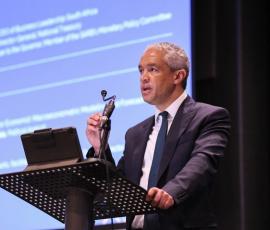
An interdepartmental working group has been established to develop a roadmap for South Africa’s digital public infrastructure focusing on digital payments, digital IDs and data exchange.
“Ultimately, we would like to improve the application and disbursement of social grants, improve the accessibility of government services and facilitate more data driven policy and decision making,” National Treasury’s Director-General (DG), Dr Duncan Pieterse, said on Tuesday in Johannesburg.
Addressing the Collaborative Africa Budget Reform Initiative (CABRI) International Conference on Public Finance in the Digital Era, Pieterse said National Treasury has been working closely with the Presidency on digital transformation under Operation Vulindlela.
“The convergence of digital technology and public finance presents a unique opportunity to elevate Public Finance Management from a narrow focus on transactions, compliance and transparency to a more strategic role that supports evidence-based policymaking, efficient service delivery and accountability.
“Through innovations such as the automation and optimisation of budget allocation and expenditure tracking, modern digital systems can significantly reduce inefficiencies and ensure that resources are allocated to areas where they will have the most impact,” the DG said.
Digital systems also enhance transparency by making financial data readily accessible to oversight bodies and the public, thereby fostering accountability and building trust in public finance management.
“We must harness the potential of digital public infrastructure to stimulate economic growth and advance inclusion. A unique opportunity exists to advance the digital public infrastructure agenda under the South African G20 Presidency through knowledge sharing across countries and insights on the cost of digital public infrastructure development, implementation and maintenance.
“Given current fiscal constraints, it is important draw out which components of digital public infrastructure should be funded by the public sector, and which can be supported by donors and other partners,” the DG said.
He said collaboration with development partners and the private sector can also provide valuable expertise and resources.
“By leveraging these partnerships, governments can access best practices, share knowledge, and secure co-financing or technical support.
“However, as systems become increasingly digital, prioritising cybersecurity and robust data protection measures become essential to safeguard sensitive information and maintain public trust.
“Ultimately, successful digital transformation in public finance management not only requires investment in software and hardware but also in the people who will drive and sustain these advancements, ensuring that public resources are managed efficiently and transparently to achieve broader policy objectives,” Pieterse said.
Despite the clear benefits, there are several challenges that need to be addressed.
“Many current Public Finance Management systems are built on outdated technology, which limits their ability to integrate data impeding making real-time, data-driven decisions.
“As robust as they are, legacy systems often hold fragmented or incomplete information, making it difficult for us to gain a comprehensive understanding of financial performance. In addition, manual data extraction requirements further delay decision-making,” the DG said.
Resistance to change is another significant barrier.
“Fear of the unknown, job security concerns, and a preference for familiar methods, contribute to a reluctance to embrace digital transformation. Without strong leadership and effective communication about the benefits of new technologies, this resistance can persist, thus slowing down progress.
“Rigid and risk-averse government procurement processes further complicate modernization efforts. Procurement processes are often misaligned with the needs of rapidly evolving IT projects, leading to delays and decision paralysis due to fears of irregular expenditure or legal risks,” Pieterse said.
Poorly structured vendor contracts exacerbate these challenges, locking governments into inflexible agreements that fail to adapt to changing needs.
“Moreover, there is often a lack of investment in developing the skills needed for digital transformation. While policies may advocate for cloud adoption and digitization, clear strategies for building these skills are often missing. And in many countries, these skills are very scarce or very expensive.
“Establishing a pipeline of in-house digital expertise - from new graduates to experienced professionals - is essential to reduce reliance on external vendors and will enable the public sector to manage and innovate with new technologies.
“Governance and coordination gaps can also hinder progress, as misaligned priorities and fragmented responsibilities slow down digital initiatives. Addressing these requires a clear governance framework that aligns stakeholders and streamlines decision-making,” Pieterse said. - SAnews.gov.za


